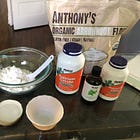Navigating the autoimmune condition
What works, what doesn't, and where we go from here.
I offer the below example of how to navigate mast-cell activation syndrome (MCAS) as someone who’s dealt with it all her life. It’s the best approach for me, but I want to acknowledge that it might not be for you. As with all Brunette Gardens content, this is intended solely for information and education, and not as medical advice. Please consult a medical or health professional if you have questions about your health. Medical science is quickly evolving, with new discoveries and answers turning over established ideas all the time, so be persistent. I was diagnosed with hay fever as a child, with asthma, interstitial cystitis, and endometriosis in the 90s, food and environmental allergies in the 2000s, and with MCAS seven years ago as an explanation for everything, though the symptoms have been the same all my life. Here’s a standard definition for MCAS.
Diet is “die” with a T
That old Garfield joke is perfect for this topic, as it can feel at times as if food is trying to kill you, or else you just want to die when you’re on an über-restrictive diet.
I’ve tried fat-free, sugar-free, gluten-free, vegetarian, vegan, the Whole 30, low-histamine, low-salicylic, autoimmune paleo, and various elimination diets throughout my life, and while some of them provided relief in the short-term, none of them worked long-term. Furthermore, even proponents of some of these diets, such as this nightmare of a diet specifically designed for MCAS, acknowledge they are deficient in essential nutrients.
What finally brought the most relief is not a diet per se but a recognition of what has happened to our modern food system, with its reliance on highly processed food and an increasing mountain of lab-concocted chemical additives in everything from shelf-stabilized wheat bread to oat milk.
While I’m uniquely sensitive to these fake foodstuffs, which often trigger symptoms, the truth is they’re not good for any of us, and they might be a major culprit behind epidemics such as diabetes and heart disease.
So if there’s a silver lining for those of us with MCAS, it’s that our condition functions as a kind of “early-warning system.”
Heeding that warning, I’ve eliminated all additives from my diet, and that includes a class of substances that can often hide in food disguised by misleading labels such as “natural flavor” or “protein-fortified.” Truth in Labeling publishes a complete list.
While supplements are often prescribed by even MDs these days to treat conditions like MCAS, they all contain additives, and there’s a real question whether our bodies can truly take in those nutrients in pill form anyway, as I explain in this post.
Rather than supplements, I treat with herbal teas and oxymels. The Herbalist's Diary has an excellent herbal rundown for MCAS.
I’ve also been transitioning toward eating only unprocessed, organic, non-GMO vegetables, fruit, whole grains, pulses, eggs, nuts, seeds, and both plant- and animal-based protein and fat without additives. It’s not the traditional American homesteader’s fare, which relies too much on modern food-preservation techniques such as canning. Heat from pressure cookers and vinegar/sugar pickling can denature food. Instead, we opt for lacto fermentation, dairy cultures, and drying or dehydrating as our main means of preservation. For sweeteners, we use honey and pure maple syrup in place of sugar. Fried foods, alcohol, and seed oils are rare to non-existent in our food routine, and neither of us smokes.
We grow or forage a good portion of our own food, as much as 20-30 percent. The rest we make up with eggs from a neighbor’s chickens, farmer’s market produce, and direct-farm purchases of raw milk and meat. It’s only after that that we opt for the grocery store, Whole Paycheck Foods, and Amazon.
You have to be particularly careful with dairy products and their alternatives, as that’s where a lot of additives hide, as I point out in my treatise on milk.
We keep a freezer for bulk meat as well as surplus berries and greens, extending our garden and foraged produce through the year. I store flour in the freezer as well to keep it fresh.
About that flour: We’re not gluten-free, as whole grain has supported human beings for thousands of years and contains essential nutrients for building and maintaining healthy bodies. It’s only recently that it became a specific health problem. See my previous story on this topic for more.
One of the problems is our modern refining process strips grain of its essential nutrients. We use whole grains, and I soak or ferment them, either as sourdough or sprouted loaves and breads. We do the same to nuts, seeds, and legumes, as all of these contain inhibiting substances that need to be removed or reduced for better digestion and vitamin and mineral absorption.
For a fantastic guide on ancestral foodways, I recommend Sally Fallon’s Nourishing Traditions.1
Home is where the start is
Because MCAS for me also means a sensitivity to environmental triggers, I’ve for decades taken steps to ensure my home is as clean as possible.
For me and Anthony, that means a simplified hygiene regimen drawing on only goat-milk products from a trusted source for body soap, shampoo, deodorant, and laundry soap.
I brush my teeth with a homegrown mix of baking soda, arrowroot powder, minerals, and essential oils. I shared the recipe in this collaboration with weedom.
Pure shea butter is a great solution since most commercial lotions give me rashes, and I also infuse olive oil with homegrown calendula and apply that nightly in the winter.
For household cleaners, we use only vinegar and baking soda, both of which work remarkably well. Baking soda actually cleans the bathtub much more easily and brightly than even Bon Ami! Once I figured this out, I couldn’t believe all the money I’d wasted on cleaners over the years.
Beyond this, I opt for hardwood floors rather than carpet, which is a giant allergen trap. We have several air filters going, open the windows for fresh air in spring and fall, and we renovated using only paint with low or no volatile organic compounds. Our basement leaks like every basement in this river town, but we conducted thorough mold remediation before moving in, keep a dehumidifier going 24/7, and replaced our gutters and put in a French drain to reduce the severity and frequency of leaks.
We don’t use scented products, perfumes, or fragrances, as they often contain endocrine disruptors that are linked to conditions like MCAS, as well as fertility problems and chronic diseases.
The brain in the main
Of the three areas of this protocol, this one’s the hardest to pin down, as our culture tends to address the body and brain as if they’re separate. Fortunately, I’ve never had a problem with doctors saying my condition is “all in my head” because they could see the rashes and hives on my skin, perform a cytoscopy and map my inflamed, scar tissue-filled bladder, examine my eyes, ears, nose, and throat to witness the inflammation and mucus, and listen to my lungs to hear wheezing.
It’s always been true that stress is a contributing factor, but how do you get rid of stress?
When I worked as a manager at a major game publisher, HR scheduled us for mandatory stress-reduction workshops. The facilitators didn’t like it when I raised my hand to ask if the company was planning to allow me to hire more staff to help with the work volume, which was more than my team could handle without putting in 12-hour days. It was our major cause of collective stress.
Some stress is out of our control, outside of extreme actions, like quitting your job, which produces another kind of stress, arguably worse.
To deal with a childhood rife with adverse experiences, along with a challenging adulthood in a slowly collapsing empire, I’ve done my share of talk therapy. Bonafide post-traumatic stress disorder, and I mean screaming nightmares, numbed shell shock, and disassociation—not just a bad hair day like y’all call PTSD now—pushed me to carefully unpack traumatic experiences with a trained professional. While all of that work was a lifesaver in other ways, it had zero impact on my MCAS symptoms, and I think that’s because they’re not psychological.
Yoga helped the most, and I think it did so because yoga breath and movement act as a yoke: Diaphragmatic, rhythmic breathing, synchronized to a movement with its own physical benefits, tethers your runaway thoughts, calming the central nervous system.
What’s always eluded me, however, is meditation. That’s a pity, as it has proven benefits that could be another key for a symptom-free life. I’m exploring this area next, looking at various programs specifically designed to employ meditation to deliberately calm an overactive central nervous system like mine, with perhaps some overcompensating wiring making it more challenging even with the best lifestyle to remain symptom-free.
I’m also looking into neuroplasticity and brain retraining as areas to make lasting changes. Is it possible to rewire your brain to stop triggering an autoimmune response to perfectly safe foods? Or even teach your body to rely on its own natural detoxification systems rather than shifting into fight-or-flight reactions? Now that I have the eating habits and home environment to support a healthy life, perhaps these are the last pieces of the puzzle.
What’s your autoimmune story?








Lisa I’m so grateful for you checking out my Substack. I’ve been on a 20+ year long road of mystery illness. I’m working on an article so that I can share my journey with healing. I have so much compassion for your story and know how difficult it can be living with a chemical sensitivity. One of our favorite purchases in our home is our iQ air purifier. One of the components of my healing was learning the truth that my body was not attacking itself. Medical research and science is spending billions of dollars on their theory that our genes are to blame. With expensive therapies, treatments and more it is a great way for them to continue profiting off the chronically ill. I refuse to believe our genes are to blame (after all autoimmune is just a theory they’ve never found proof that the body is attacking itself). The Industrial Revolution brought a new class of chemicals that we are all exposed now to daily. Our liver was never made to filter out pesticides like DDT and toxic heavy metals that are now found in our air, water and land. We’re up against so much in this world today. Medical research and science is refusing to put money into finding the root cause of these illnesses. Maybe it is because they would then have to admit they are to blame for the epidemic of chronic illness.
What a fabulous informative post. Thankfully I am not allergic to anything other than a couple of medications, skin is my main issue, dry and excema prone, and definitely nothing scented and no soaps. The trouble you have gone to through your life to help yourself health wise is a credit to you, and now you have passed on that information to others.